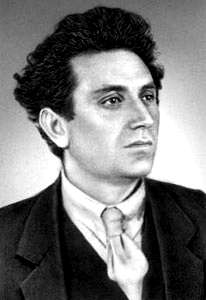More languages
More actions
Grigory Zinoviev Григорий Зиновьев | |
|---|---|
 | |
| Born | Ovsei-Gershon Aronovich Radomyslsky 23 September 1883 Yelizavetgrad, Russian Empire |
| Died | 25 August 1936 Moscow, RSFSR, Soviet Union |
| Cause of death | Execution |
| Political orientation | Trotskyism |
Grigory Yevseyevich Zinoviev (23 September 1883 – 25 August 1936) was a Soviet politician and Trotskyist. He opposed Lenin as early as 1910[1] and was executed in 1936 following the Moscow trials.
Early life
Grigory Zinoviev was born in Yelizavetgrad, in the Russian Empire (modern Kropyvnytskyi, Ukraine) to a family of Jewish dairy farmers who educated him at home. He was also known to go by the name Hirsch Apfelbaum as a young man. He joined the RSDLP in 1901.
Pre-revolution
In January 1910, against Lenin's wishes, Zinoviev, Kamenev, and Rykov convened a Plenum of the Central Committee of the RSDLP. Because many Bolshevik members of the CC had been arrested, the Plenum passed some anti-Leninist resolutions. Zinoviev disagreed with Lenin's decision to denounce otzovism and liquidationism.[1]
At the 7th Congress of the Bolshevik Party in April 1917, Zinoviev opposed Lenin and called for the party to remain in the Zimmerwald Conference instead of forming a new international. In October 1917, Zinoviev and Kamenev voted against the October Revolution[2] and believed a proletarian revolution was not possible in Russia. The two then informed the Provisional Government about the Bolshevik's intent to stage an uprising through a Menshevik newspaper. Upon their actions, Lenin dubbing them strikebreakers and "blacklegs"[3], demanded their expulsion from the Party[2]
Post-revolution
Just after the October Revolution, Zinoviev, alongside Rykov, Shlyapnikov and others, called for the formation of an all-socialist government that would include the deposed SRs and Mensheviks.[2] When the Central Committee rejected their counter-revolutionary proposal, Kamenev, Zinoviev, Rykov and Milyutin, resigned from the body. At the Congress of the Toilers of the East in 1920, he said that land reform was the most important issue in Central Asia.[4]
Zinoviev believed Russia was not developed enough to build socialism. Following the 14th Congress of the CPSU in 1925, he called a meeting of the Leningrad Provincial Committee of the YCL, which refused to follow the Congress's decision promoting industrialization.[2]
In 1926, Trotsky and Zinoviev formed an anti-Party bloc and rejected democratic centralism. The Central Committee expelled them from the party in November 1927.[5] Zinoviev organized the murder of Sergei Kirov in 1934.[6]
References
- ↑ 1.0 1.1 Joseph Stalin (1939). History of the Communist Party of the Soviet Union (Bolsheviks): 'The Mensheviks and the Bolsheviks in the Period of the Stolypin Reaction. The Bolsheviks Constitute Themselves an Independent Marxist Party'.
- ↑ 2.0 2.1 2.2 2.3 “Two members of the Central Committee, Kamenev and Zinoviev, spoke and voted against this historic decision.
Lenin wrote in this connection: "Kamenev and Zinoviev have betrayed the decision of the Central Committee of their Party on the armed uprising to Rod-zyanko and Kerensky." Lenin put before the Central Committee the question of Zinoviev's and Kamenev's expulsion from the Party.
Certain notorious opportunists within the Party—Kamenev, Zinoviev, Rykov, Shlyapnikov and others—also made a sally against the Soviet power. They demanded the formation of an "all-Socialist government" to include Mensheviks and Socialist-Revolutionaries, who had just been overthrown by the October Revolution.”
Joseph Stalin (1939). History of the Communist Party of the Soviet Union (Bolsheviks): 'The Bolshevik Party in the Period of Preparation and Realization of the October Socialist Revolution'. - ↑ “My answer to this threat is that I shall go the limit, I shall win freedom of speech for myself before the workers, and I shall, at whatever cost, brand the blackleg Zinoviev as a blackleg. My answer to the threat of a split is to declare war to a finish, war for the expulsion of both blacklegs from the Party.”
Vladimir Lenin (November 1, 1927). Letter to the Central Committee Of The R.S.D.L.P.(B.). - ↑ Vijay Prashad (2017). Red Star over the Third World: 'Soviet Asia' (p. 64). [PDF] New Delhi: LeftWord Books.
- ↑ Joseph Stalin (1939). History of the Communist Party of the Soviet Union (Bolsheviks): 'The Bolshevik Party in the Struggle for the Socialist Industrialization of the Country'.
- ↑ Joseph Stalin (1939). History of the Communist Party of the Soviet Union (Bolsheviks): 'The Bolshevik Party in the Struggle for the Collectivization of Agriculture'.
